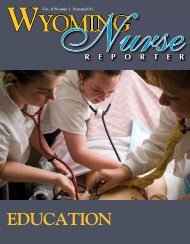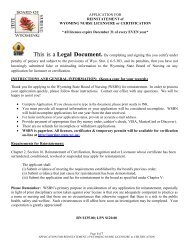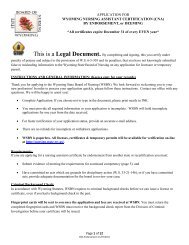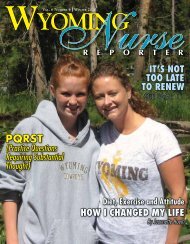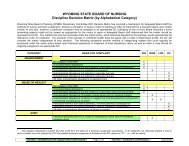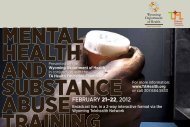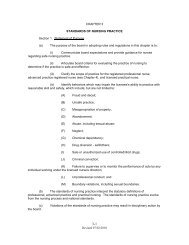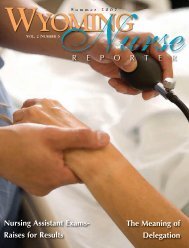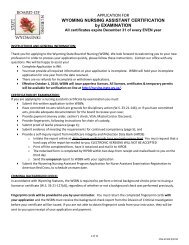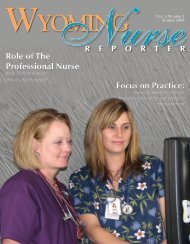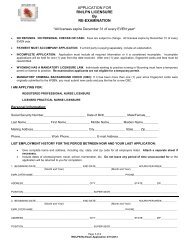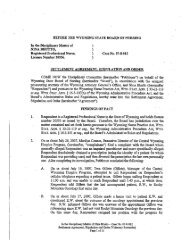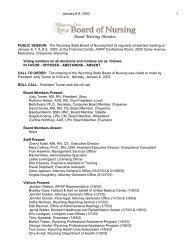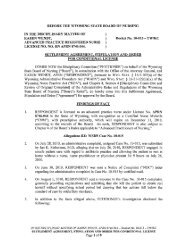What is yourHandicap?Interview with Melanie PalluckMarcia L. Dale, RN, EdD, FAANWhether we like it or not, each andevery one <strong>of</strong> us has a handicap. Yes, thereare things that we do very well, and thereare things that we don’t do well at all. Wecompensate, ask for help, win at the game<strong>of</strong> life in spite <strong>of</strong> the flaws or give in andblame failure on the imperfection.Lynne Shaw in Leave no nurse behind:<strong>Nurse</strong>s working with disabilities (2006),made the statement that life is not fairnor is anyone perfect. How right shewas. Each <strong>of</strong> us has struggled with ourimperfections, some more predominantthan others. One particular nurse whowas gracious enough to tell her story told<strong>of</strong> fighting the battle <strong>of</strong> obesity her entirelife. However, she worked three nights aweek in obstetrics and/or the operatingroom for 36 years. The nights fit her lifestyle, as she also took care <strong>of</strong> her grandchildrenduring the week. Cognizant<strong>of</strong> the old saying, “old nurses eat theiryoung,” this “old” nurse thought she wasassisting the young nurses by relievingthem for lunch and c<strong>of</strong>fee breaks, and<strong>of</strong>fering a helping hand. Much to heramazement, two complaints were filed bythese young nurses who reported that thenurse was “hiding out” in the nursery.After much soul searching andheartache, the nurse decided to undergogastric bypass surgery but was told thather oxygen saturation levels were too low.Not to be waylaid, she went on oxygen,only to be told that she could not workin the nursery, as she might drop a baby.Being floated to a medical floor added toher grief, as there she was told to go homeon sick leave.The gastric bypass was performed.Ironically enough, care was given by anurse on oxygen. Life isn’t fair! Thesurgery has been successful in that the“patient” lost 120 pounds, has an acceptableoxygen saturation level, has nojoint pain, and can walk and handle stairswithout getting out <strong>of</strong> breath. Life shouldbe good, but for this nurse, it is not. Shehas sent out numerous letters <strong>of</strong> applicationand has had no calls for interviews.The problem now might be age discrimination,as 62 years <strong>of</strong> age is consideredold by those who have not reached thatage. It is indeed sad to know that a registerednurse who overcame obstacles nowworks for $10 an hour in a position that aless well educated person could do. Shehas a pension that covers her mortgage,but the belief that she can’t afford to liveout the extended life her gastric bypassmade possible is reducing the enjoyment<strong>of</strong> what could be the golden years.Within the white paper titled Wisdomat Work (Robert Wood Johnson Foundation,<strong>2008</strong>, April), problems <strong>of</strong> an agingworkforce, challenges that health carefaces when nurses retire early, and possibilitiesfor retaining nurses were identified.It is a fact that older workers stayon the job longer after training, reducingturnover costs. (Memory impairment isless than five percent in people 65-69,and learning new things is a part <strong>of</strong> anideal job.) Staffing and workload are twoother factors affecting retention <strong>of</strong> nurses.Rosenfeld (2007) indicates that creating“‘caregiver-friendly’ practices such as creative,flexible scheduling, access to socialworkers, financial and legal services, andincreased awareness among managersabout caregiver strains were recommended”as ways to retain older, experiencednurses (p. 120). Those same strategiesshould be used to retain nurses with adisability. Assessment <strong>of</strong> the “disabilityclimate” is another way to determinewhether the work setting is conducive tothe success <strong>of</strong> the disabled nurse.Disability climate is a key determinant<strong>of</strong> the successful integration <strong>of</strong> individualswith disabilities into the work forceand a major influence on the level <strong>of</strong>occupational stress experienced by thispopulation. Industry-specific attitudesregarding disabilities have an effect ondisability climate as perceived by workers,as do formal and informal policies,procedures, and practices. Occupationalhealth nurses can impact organizationaldisability climates through implementation<strong>of</strong> disability climate programs, thusimproving workplace conditions forworkers with disabilities and reducingoccupational stress (Matt and Butterfield,2006, p. 129).Whether one identifies the agencyas “care-giver friendly” or as having apositive “disability climate,” the workplace environment is so important to theretention <strong>of</strong> nurses. Each nurse must beeducated about these issues and assumea lead role in the creation <strong>of</strong> a positiveworkplace. The responsibility fordeveloping a work environment wheresensitivity, compassion, respect andconsideration for others are prime valueslies with everyone, not just the employer.The inclusion <strong>of</strong> nurses with disabilities,however those may be described orinterpreted, can only lead to the diversitythat makes our occupational life rich andsatisfying.ReferencesMatt, S. B. and Butterfield, P. (2006).Changing the disability climate: Promotingtolerance in the workplace. AmericanAssociation <strong>of</strong> Occupational Health<strong>Nurse</strong>s, 54(3), 134-135.Robert Wood Johnson Foundation(<strong>2008</strong>, April). Featured Research: Wisdomat work. New research provides solutionsto the nursing shortage: Improvingretention <strong>of</strong> older and experiencednurses in the workforce, 6, 3-8.Rosenfeld, P. (2007). Workplace practicesfor retaining older hospital nurses:Implications from a study <strong>of</strong> nurses witheldercare responsibilities. Policy, Politicsand <strong>Nursing</strong> Practice, 8(2), 120-129.Shaw, L. (2006). Hill, what hill?<strong>Nursing</strong> with Guillain-Barre’, osteoarthritisand lifelong obesity. In D. C. Maheady,Leave no nurse behind: <strong>Nurse</strong>s workingwith disabilities, (pp.19-25). New York:iUniverse Inc.16 W y o m i n g N u r s e R e p o r t e r
If you are DisabledAdapted from Career Fitness Tips for Disabled <strong>Nurse</strong>s by ValerieRestifo, <strong>Nurse</strong> Week, February 20, 2001Disabilities can happen at any stage in one’s life. Be prepared toavoid as many as possible by staying healthy. An attitude <strong>of</strong> beingflexible, continuing to earn certifications and degrees, and beingpositive will help to avoid being defined by a disability. It is howyou handle the disability that makes the difference.The right strategies will help get a promotion, a new position, or acareer transition after an injury or illness.1. See yourself as a problem solver! Focus on the things you cando well. Sell your qualifications, strengths, achievements, andcareer goals.2. Don’t mention your limitations or inabilities in your cover letteror application. When asked if you can perform certain duties<strong>of</strong> the position, state what reasonable accommodations you willneed. Focus on what you can do, not what you cannot do.3. Use your pr<strong>of</strong>essional contacts. Many jobs are found throughnetworking. Tell all the pr<strong>of</strong>essionals you know what you arelooking for and what your qualifications are.4. Think positively. Your enthusiasm, optimism, and positiveapproach will get you far. Answer questions with a positiveresponse.5. Do your homework about the position for which you are applying.Ask for a tour to see if you can handle the layout. The moreyou know, the easier it will be to make a decision about an <strong>of</strong>fer.6. Seek out employees <strong>of</strong> the organization where you want towork to determine if they are open to pr<strong>of</strong>essionals undergoingrehabilitation.7. Look your best and be as healthy as you can be. Schedule theinterview when you are at your best. Clothes, cosmetics, and accessoriescan give you a business and confident look.8. If you didn’t sell yourself for the position, reassess and try again.Remember, you have something to <strong>of</strong>fer. Matching your assets tothe job is the winner.Student <strong>Nurse</strong>s with DisabilitiesMartha Smith, coordinator <strong>of</strong> the HealthSciences Faculty Education Project at theOregon Health & Science University inPortland is working to increase the retention<strong>of</strong> students with disabilities in health scienceprograms through a federally funded program.The purpose is to educate and train faculty tounderstand students’ needs. In most cases <strong>of</strong>nurses or students with disabilities, the biggestobstacle is attitude. Usually, the initialreaction <strong>of</strong> seeing someone with a disabilityis that the person needs to be fixed. Not so!The person can be competent as a healthcare pr<strong>of</strong>essional. Whether voiced or not,the common thought is that a nurse with adisability may not be able to provide safe,competent care. This thought is prevalentamong nursing faculty, students, nursingpeers, physicians and patients. No secondchance is given. If a mistake is made, the assumptionis that it was because the performerwas disabled.The University <strong>of</strong> <strong>Wyoming</strong> Fay W.Whitney School Of <strong>Nursing</strong> has a statementMarcia L. Dale, RN, EdD, FAANin their admission policies that states: “Allstudents must be able to perform the essentialfunctions <strong>of</strong> a student nurse. Reasonableaccommodations will be afforded to studentnurses with disabilities as required under theAmericans with Disabilities Act <strong>of</strong> 1990;Faculty and staff from the School <strong>of</strong> <strong>Nursing</strong>will work with staff from the University DisabilitySupport Services to determine whatconstitute reasonable accommodations.”The ADA allows schools to list technicalstandards or essential functions -abilities thata potential student must possess to succeed.These can prohibit some students from beingadmitted, the opposite <strong>of</strong> the intent <strong>of</strong> theADA. Students have been known to have toapply to several schools before being admitted.Be persistent. Usually, the faculty tendsto expect the student to be more limitedthan they are. Don’t let them decide whatcan and cannot be done. Not admitting toa disability is not uncommon, as that mightcontribute to admission. This however, onlydenies special accommodations to which thedisabled are legally entitled. Some specialequipment such as amplified stethoscopes, vibratingpagers, automatic blood pressure cuffsand digital thermometers have helped nurses.Being given more time to take an exam orto perform a skill might be necessary. Askingfor an interpreter or reader might solve aproblem. These solutions are not beyond areasonable accommodation.ReferencesCarol, R. (n.d.). <strong>Nurse</strong>s with disabilities. Minority<strong>Nurse</strong>.com. Retrieved June 23, <strong>2008</strong> from http://www.minoritynurse.com/features/nurse_emp/01-27-02h.htmlDenver’s <strong>Nursing</strong> Star (<strong>2008</strong>, June 23). Disablednurse succeeds despite hurdles, attitudes. RetrievedJune 23, <strong>2008</strong> from http://www.denvernursingstar.com/newsletterMaheady, D. C. (2006) Leave No <strong>Nurse</strong>Behind: <strong>Nurse</strong>s Working with disabilities. New York:iUniverse, Inc.www.Exceptional<strong>Nurse</strong>.comwww.healthsciencefaculty.orgDisciplinary ActionsRuth KearneyLetter <strong>of</strong> Reprimand Drug Diversion 7/08/<strong>2008</strong>



